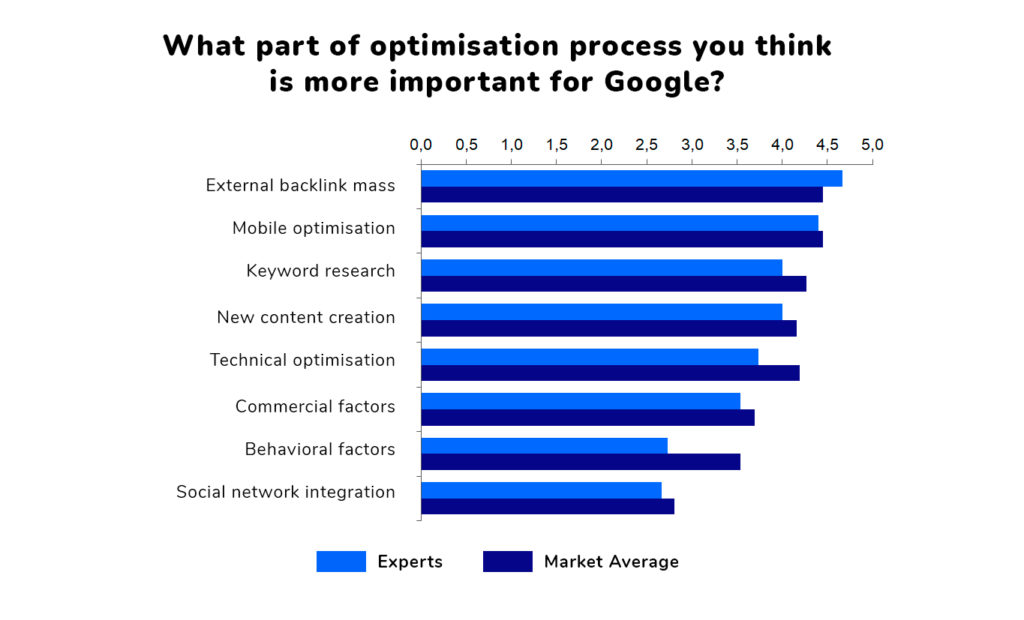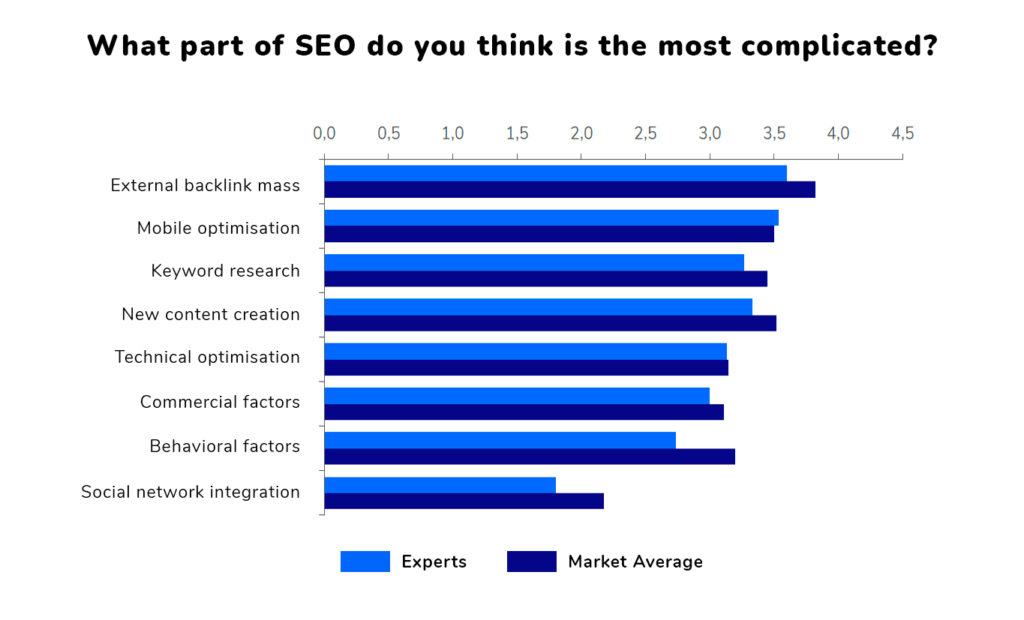Often, clients may not understand the specifics of promotion and hold erroneous views about the methods and strategies of the SEO-specialist. This is especially true for link building, which many may perceive as manipulation, suspicious, doubtful, or ineffective solutions, and therefore may not allocate a budget for it. Only the SEO specialist can dispel doubts and misconceptions of the client.
Several myths exist around link promotion. If experienced specialists may ignore such information, their clients might believe that links are outdated. It’s important to convince them otherwise, as promotion will be more difficult and expensive without link building.
People often judge superficially based on information they once read or heard. While this is normal, a client’s lack of knowledge should not decrease the effectiveness of a project. Therefore, it’s crucial to learn how to explain and defend the promotion plan.
SEO specialists often work with Advertisers and Publishers. In small companies, promotion issues are discussed directly with business owners. All these people have many tasks and little time. Prepare concise theses for them and support each with numbers and links to cases.
Don’t overwhelm the client with all the information you have, focus on their area of responsibility and what is commonly called “client pain points.”
For example, a business owner needs to understand what exactly they will get for the money invested in link building: “If we give up links, promotion will take twice as long, during which time you will not receive orders worth ‘x’ dollars. If we use links, we will only spend ‘y’ dollars per month.”
A marketer needs to know how link building will help bring the site to the TOP: “Currently, competitors have ‘x’ links from the most popular portals in the city. If we get twice as many equally quality links, we will surpass them in search results and increase the number of leads.”
Business Meeting
When you prepare a promotion plan, make comments and explain why each action is needed.
Incorrect: “This month I need twice as much money for promotion.” Correct: “Competitors are actively engaged in link building. To surpass them, we need to increase our link factors this month and get N links. This requires adding Y hundreds of dollars to the budget.”
This approach shows the client that you understand their tasks and know how to solve them.
Method of Specialists
Link building is necessary, used by SEO experts, and most top search engine sites have been promoted with links.
This is particularly true for promotion in Google. In other search engines, the market is slightly skewed towards the manipulation of behavioral factors, which some SEOs neglect links for. This is a risky strategy that can easily lead to a six-month ban.
In contrast, links are a long-term investment in site promotion. If handled carefully, there will be no penalties.
The Serpzilla team conducted a comprehensive market study in early 2021 based on a survey of 414 different SEO specialists. Professionals talked about link building and search optimization trends. You can view the study results at this link. In our guide, we will present the most interesting figures from our survey that can be used when communicating with the client.
- More than 90% of survey participants engage in link building. Among experts, almost all use links to some extent.
- Experts named link promotion as one of the most critical components of optimization in Google. At the same time, behavioral factors play a lesser role in Google than in other search engines.

- Links are undoubtedly useful in both Google and other search engines. Google favors them more, but this is only because other search engines have a different ranking system for commercial topics. All things being equal and with proper internal optimization in place, a well-implemented link strategy helps achieve top rankings.
- According to experts, promoting sites using behavioral factors is more difficult than using link building. In working with links, 63% of the respondents identified choosing quality donors as the most challenging aspect.

- More than 60% of specialists acquire 10–100 links per month. A large number of links (over 1000) are obtained by only 1% of respondents. This is because such a volume of links is only necessary for very large businesses with a huge assortment and extended geographical presence, and there are not many such companies.
- Over 70% of respondents believe that the effectiveness of link building will remain at the same level in the near future.
Link building is not related to gray schemes
If a client is categorically against links, ask for the reason. In 90% of cases, you might hear something like, “Link building is a gray promotion scheme, and decent sites don’t use it.”
This objection would have been relevant in the 2010s when SEO specialists indeed mass-purchased links from low-quality resources. At that time, the number of external links to a site was important, regardless of their quality.
Nowadays, search engines are more demanding regarding link promotion. The gray method doesn’t work, and no competent specialists use it. Excessive amounts of similar anchors from low-quality resources will lower the site’s ranking in search results or put the resource under penalties and cause problems for months ahead.
Link building is not just buying any links, but a systematic work with the link profile.
SEO specialists create a promotion strategy and choose links of different types, based on analyzing the actions of competitors who are promoted by the same queries.
It’s especially important to study competitors in the top search results. Tell the client about the steps of your work for link-building promotion:
- Analyzing competitors’ link profiles, showing the anchors, donor sites they use, how many and what kind of links they buy,
- Compiling a plan for link placement,
- Selecting donor sites on quality resources,
- Placement.
Show the client that you only work with verified services. They select quality platforms for promotion and offer all types of links.
To determine the quality of a site, ‘trust meters’ are used – indicators of authority, citation, traffic, etc. For example, at Serpzilla, we look at the site quality index (ИКС), site age, and SR (page traffic). This simplifies the donor search process and saves money. For instance, you can buy thousands of links filtered by the required parameters within an hour.
Types of Links
Often for marketers and business owners, it’s not obvious that links can be different. Therefore, you can briefly explain to the client about different types of links and which ones are preferred by search engines.
Explain that ideally, the link profile should be as diverse as possible, and tell about the different external links it can consist of:
Natural and Purchased.
External resources place the first type of links freely to voluntarily share content on your site. To regularly receive them, you need to publish useful materials, such as market research, guides, etc. Crowd-links, i.e., links left by users in comments, forums, review sites, etc., also fall under natural links and are used by 90% of respondents in the study. Purchased links are acquired on special exchanges. Using reliable resources and carefully selecting platforms can make them equally effective.
Anchored and Non-Anchored.
An anchor is a word or phrase that hides a link. For instance, here’s how an anchored link to an article about anchors in Wikipedia might look. If the anchor fits organically into the text, it boosts the site’s ranking in search engines. Non-anchored links are URLs, brand names (e.g., Serpzilla), images, general phrases (“see here”, “read the link”), etc.
Indexed and Non-Indexed (nofollow).
The first ones participate in site promotion, while the latter do not. To get a non-indexed link, ‘nofollow’ is written in the page code, so the search engine will not increase the link weight of the resource it points to. This is how service pages are marked, to prevent spam in comments, etc.
Permanent and Rented.
Quality permanent links are most attractive, as they are placed on a page indefinitely and are integrated into the site’s context. Rented links will be on the resource as long as you pay the rent. They are easier to obtain and are cheaper, but search engines value them just as much.
Regarding our survey, most link builders said that when choosing the type of links, they are guided by the promotion budget:
- Budget up to 50 dollars – 80% rented links;
- 50–150 dollars – 50% rented links + 30% permanent + 20% crowd;
- Budget over 150 dollars – 30% rented links + 50% permanent + 20% crowd.
Myths about Bans and Penalties Some customers fear buying links due to concerns about being penalized by search engines or believe that only natural links are suitable for promotion. There are three popular myths about this that we can help debunk.
The Top 3 SEO Myths
Myth 1
My site will be banned for links and it won’t be promotable at all. In reality, myths about penalties are like scary stories about the red hand in a children’s camp. Everyone has heard them, but no one has seen them. 90% of the experts we surveyed consider the risk of penalties very low. None of the experts chose the response “The problem of penalties is relevant.”
The maximum trouble you face is that a search engine may not consider a link that does not match the theme of the site where it is placed. This is solved by competent link building. In any case, specialists confirm based on their experience that such actions do not lead to a ban.
Myth 2
Search engines themselves assert that links don’t work. In July 2021, Google talked about new rules for working with links in its blog. It would be strange for a popular search engine to publish an article about something that doesn’t work. Moreover, thanks to leaked information about other search engines’s search algorithms, it was confirmed that this search engine also pays significant attention to the link environment of sites.
Some marketers misunderstood this news, thinking that “link building is no longer relevant.” However, the discussion was only about thoughtless purchasing of low-quality links. Links on spam-ridden forums and sites not relevant to the topic do not work.
It’s important that not only the theme of the donor and acceptor matches, but also the theme of your site and the article in which it is placed. The donor should attract organic traffic and be found on the first pages of search.
Therefore, the discussion is about higher-quality link building, not about abandoning it. Quality links, purchased from verified reliable exchanges, still affect site ranking.
Myth 3
Links are slow and expensive, so they are only suitable for large companies SEO promotion in general does not yield as quick results as, for example, contextual advertising. However, this doesn’t mean that the effects of link building have to wait for a year. Depending on the budget, results can be obtained in a few weeks or months.
Overall, our experience shows that without quality link promotion, it’s impossible to achieve growth in search engine positions. Especially when it comes to Google. Despite this, many myths exist around link building. However, if you effectively communicate facts, figures, and cases to the client, most concerns will be dispelled.



